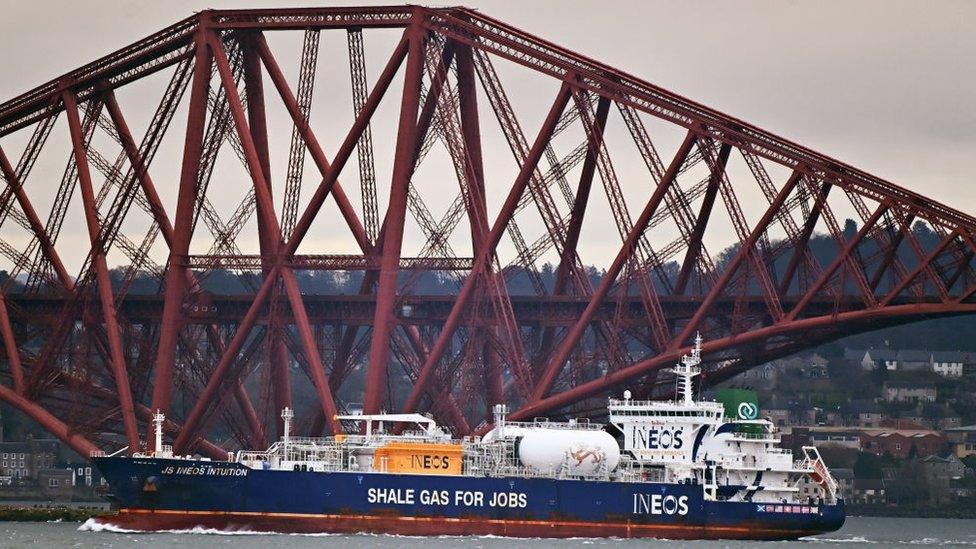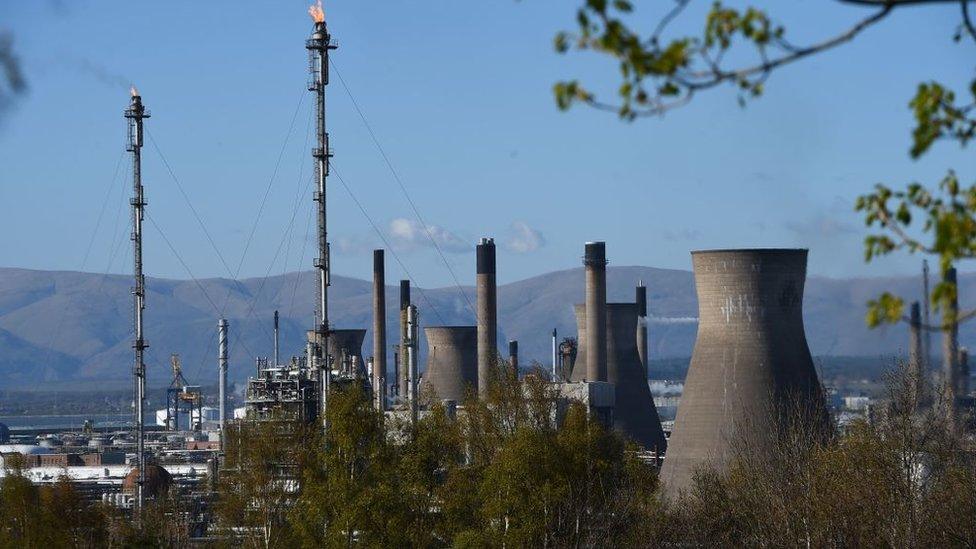Grangemouth closure 'key test' of just transition
- Published

The forthcoming closure of the Grangemouth oil refinery will be a key test of whether the "just transition" can be a reality, a watchdog has said.
Hundreds of jobs are at risk at the site, with plans to convert the refinery into a fuels import terminal.
Talks are ongoing between bosses at Petroineos, unions and the Scottish and UK governments about the workforce.
But the Just Transition Commission has warned that "meaningful and pragmatic support" will be needed.
The independent group said that Scotland was not currently on course for a just transition, and that cases like Grangemouth would be key in establishing its credibility.
The Grangemouth refinery is owned by Petroineos - a joint venture between Chinese state-owned firm PetroChina, and London-based Ineos.
The company announced in November that a £10m project was under way to convert the site into a fuel import hub.
Answering questions from MSPs on Holyrood's economy committee, head of external affairs Iain Hardie said the refinery business had posted losses in recent years, and that margins would only fall in future.
No date has been given for when the refinery will close, but the infrastructure work is due to be complete by the spring of 2025.
A further £40m investment could be needed by May of that year to allow the site to get a licence to continue operating - a "big hurdle" which also suggests that could be a likely deadline for the plant shutting down.
Mr Hardie insisted that no decision about a closing date had been made, but said: "There is a recognition that the refinery will close.
"We wouldn't be putting these measures in place if we had line of sight to the refinery operating for the next 20 years. That's simply not the case and nobody in the refinery industry or the Scottish or UK government reasonably believes that.
"What we are doing is putting infrastructure in place so that as and when the business makes that decision, there is no change in terms of a continuity of supply position for Scotland."

Grangemouth will shift to an import business model in the coming years
Mr Hardie also said that the "highly skilled staff" at Grangemouth were "the absolute focus of management", with talks with unions continuing about measures to protect them, including increased pay and redundancy terms.
There have been questions about how many jobs are actually at risk, with both Mr Hardie and Economy Secretary Neil Gray saying that the widely-circulated figure of 400 was "an assumption rather than a definite".
The refinery has around 500 dedicated staff. The new import hub would require around 100 to stay on, while a further 50 would be needed for decommissioning and demolition work for a period of around three years.
Mr Hardie also said about 100 staff could be eligible for retirement by the time the refinery shuts.
However, he said calculations about the impact on the wider supply chain - which supports many more jobs - had not been finalised.

Economy Secretary Neil Gray said a just transition plan for Grangemouth would be published next spring
The meeting took place hours after world leaders at the Cop28 climate summit had called for a global move away from fossil fuels - and shortly after the Just Transition Commission had published its latest report.
The independent panel was set up to track progress towards a "just transition" - the idea, frequently cited by politicians, of moving away from oil and gas without mass job losses or the industrial decline seen after the UK's coal industry shut down.
Their "Time to Deliver", external paper presses for the talk of a just transition to be backed up with real leadership and investment.
It says the just transition "should from here on be used to describe a detailed and specific set of policies, actions and investments that further tangible progress along a well-defined pathway" - adding that "use of just transition as a 'fix all' term without specific policies and actions to actually realise it must be avoided from now on".
The report cites the prospect of "unplanned and unmanaged" job losses at Grangemouth as "an immediate imperative to establish the credibility of just transition as a national mission".
It added that workers needed "meaningful and pragmatic support" to move into low-carbon industries.
'Constructive' meetings
Mr Gray told MSPs that a specific just transition plan for Grangemouth would be published next spring.
He said "very good and constructive" meetings had been held with the Unite and STUC unions, who were "working very closely with management" to protect the workforce.
On the broader question of a just transition, Mr Gray said the goal for ministers was "to see as many people as possible retained in the energy sector and elsewhere".
He said the work being doing particularly in the supply chain for offshore wind projects could demonstrate to the "highly skilled and valued workforce" that they could have "a strong energy-related career in green industries here in Scotland".
The Scottish government has set up a fund to invest £500m in the just transition over 10 years, with the first round of grants, external announced in September.
- Published22 November 2023

- Published22 November 2023
